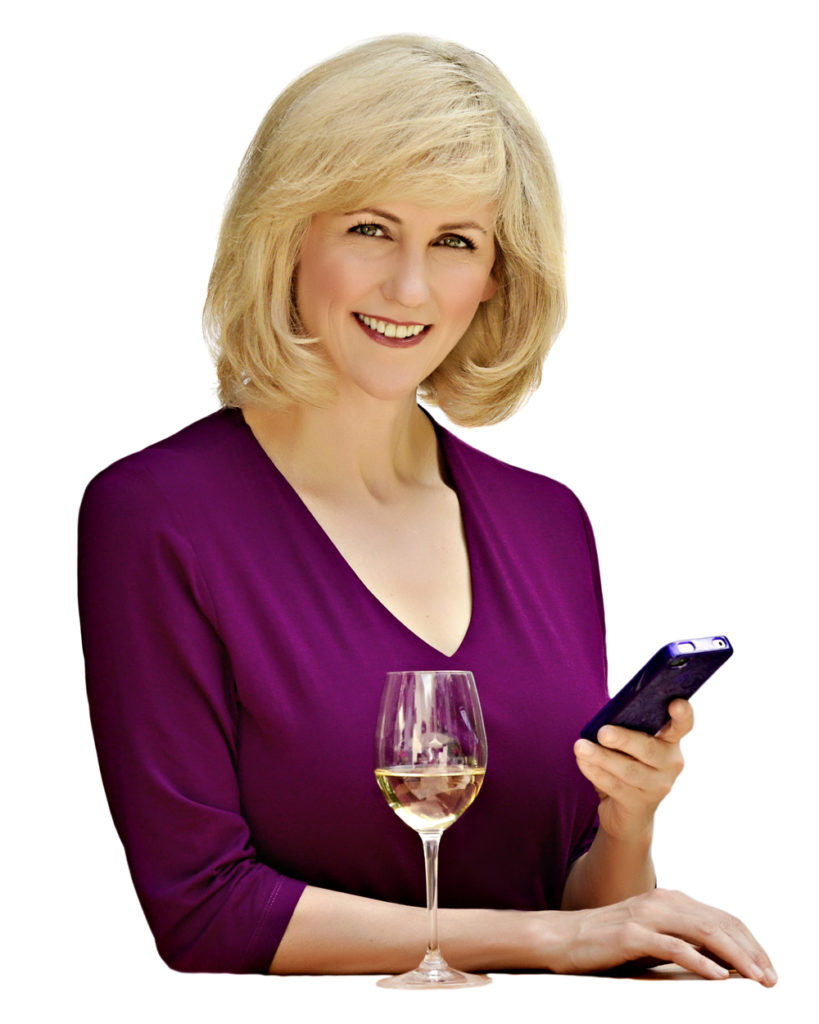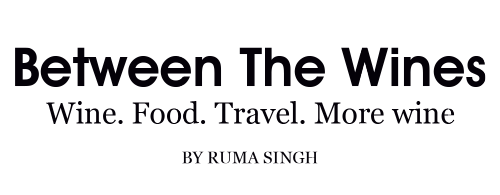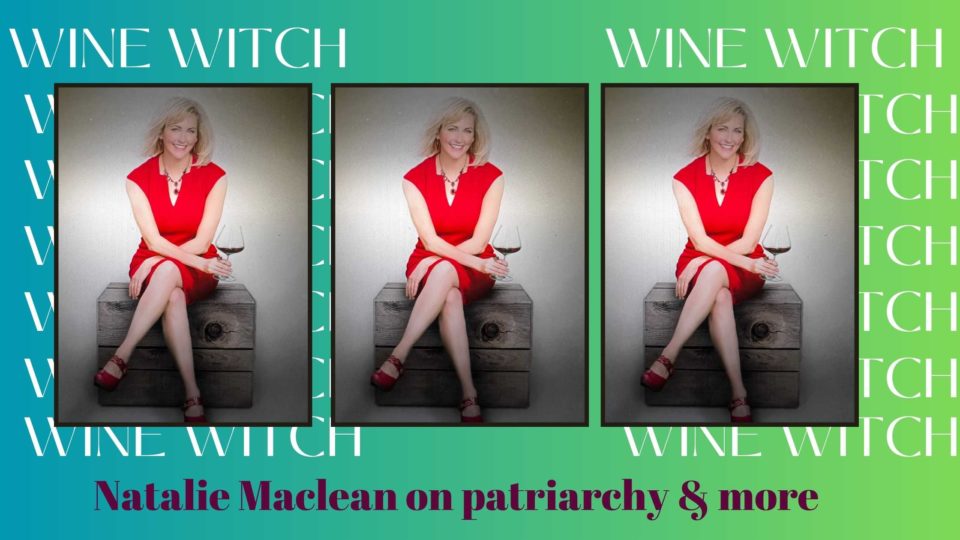‘We can’t control what happens to us, but we can change how we think about it’ Natalie MacLean Part 2
Patriarchy, bullying, harassment, gaslighting, being talked down to. These are some of the issues women face in every industry, and in wine as well. Wine professional Natalie MacLean refers to these in her memoir, Wine Witch. The interview, continued
Let’s talk about patriarchy in the wine industry. Besides your own experience, there was the big Court of Master Sommeliers issue (2020) as well, among others. Do you feel the publicity and awareness of these issues are changing the way women are viewed in the industry? Have you personally seen any changes? Or do you feel the process will take much more time?
The events in this book happened years before movie producer Harvey Weinstein, and others were convicted of sexual assault, and the #MeToo movement so there’s far greater awareness of these issues universally. The restaurant industry has exposed the sexual harassment by celebrity chefs and restaurateurs such as Mario Batali, Ken Friedman, and others. The wine industry, however, is much smaller and less formalized than the restaurant industry. That makes it more prone to these abuses — and less likely to admit them. In such a clubby industry with a powerful social grapevine, you can quickly be ostracized.
More than 80 percent of U.S. and Canadian wineries are tiny, producing less than five thousand cases a year and with fewer than twenty employees, according to industry statistics. Most don’t have a human resources department, let alone a harassment policy. Even when there is one, it’s often not communicated to employees. In the drinks business, like others, the cultural norms are established at the top.
Entry-level winemaking, sommelier, and other positions are apprenticeships with a mentor rather than conducted via group training. Even candidates with a college or university education must still apprentice. They’re often young and rely on their boss to refer them to their next position. These close, one-on-one work relationships with great power differentials can easily be manipulated.
A 2018 survey by the U.K. hospitality industry union. It revealed that 89 percent of hospitality workers and 80 percent of female agricultural workers reported on-the-job sexual harassment, statistics that don’t even include other forms of power abuse.
In 2020, the New York Times published Julia Moskin’s scathing, multi-page exposé of the wine industry’s rampant sexism, with twenty-one women reporting that they had been sexually harassed, manipulated, or assaulted by male Master Sommeliers. The article noted that the abuse was a continuing problem of which the Court of Master Sommeliers leadership had long been aware. Women who had had relationships with the men were called “sommsuckers.”
The fallout was swift. Seven Master Sommeliers were suspended or stepped down for sexual misconduct, including the chairman of the organization. There were calls for the entire board of directors to resign and to disband “the court.” Master Sommelier used to be one of the most coveted designations in the industry. In my opinion, it’s no longer viewed that way.
Many of those interviewed in a series of follow-up Times pieces believed this was only the beginning for the last pale, stale, male preserve now imploding with its own #MeToo revelations.
So the short answer is that a lot has changed, but a lot still needs to be done.
Wide-ranging risks of overindulgence and alcohol dependency. Although this isn’t a self-help book, you do share tips on how you moderated your own alcohol consumption. Share a few of those with us, please.
When I open a bottle, I’ll pour half the wine into a clean, empty half bottle and recork it. It keeps the wine fresh for another night, and I’m more mindful about how much I’ve consumed.
I drink a glass of water for every glass of wine to stay hydrated and to slow my alcohol consumption.
I ask myself what was the thought before the thought, “I need a glass of wine.” If it’s about relieving stress and not enjoyment, then I try to find another way to do that: go for a walk, take a bath, or watch a favourite show.
There are lots more tips in the book.

“I hope the book will spark a conversation in the wine industry and beyond it. It gets people talking about larger societal issues such as how they feel about their own relationship to alcohol post-pandemic, the bittersweet taste of wine-mom culture, and what role social media plays in their lives…”
– Natalie MacLean
What are your views and what personal advice can you give young people entering the industry?
On my podcast, Unreserved Wine Talk, I asked Karen MacNeil, author of The Wine Bible, what she’d advise young women entering the wine industry. I was really asking for myself as I needed a new approach.
“Be more serious about business. Be ambitious,” she said. “I can’t tell you how many business cards I have from professional women who call themselves Wine Chicks, Wine Goddesses, Wine Divas, Wine Dolls. Language can marginalize.”
Ouch. My email signature was Chief of Wine Happiness. As women, we’re taught to be caregivers, which is easily manipulated. Is the desire to be liked or, at least, to not appear threatening, part of why women in the wine industry belittle their own skills and experience with cutesy names?
I asked her if we make wine more accessible with self-deprecating humour?
“No, not unless you’re already in a position of power.”
True, we don’t see those monikers with men: Harvest Hunks, Wine Warlocks, or Stainless-Steel Studs.
Then there’s the title of this book, Wine Witch on Fire. Language can marginalize, but it can also reclaim lost meaning. As I wrote my story, I also wanted to counter the old narrative about wicked witches, just as I wanted to be professional without depersonalizing myself.
MacNeil told me women also overexplain and second-guess themselves. I call it talking past the sale. This is made worse by what MacNeil describes as an insidious and often subconscious form of harassment: “Being belittled, ignored, talked over, looked past, demeaned, interrupted, reprimanded, corrected, or addressed as a junior, among countless other slights and abuses — takes a toll on anyone’s confidence.”
There it was: gaslighting. Both MacNeil and I make our living by giving our opinion on wine. The challenge is owning your expertise when you’re constantly undermined.
“Give a lot and ask for a lot,” MacNeil said. “Take risks. Adopt a professional, business-oriented tone of voice and dress the part. Take control when you can and when it’s appropriate.”
MacNeil’s words resonated with me, not just professionally but also personally. I realized it was time to take myself seriously, not to be so jokey and deflective about my accomplishments. If I started appreciating them more, perhaps I wouldn’t always be hunting for new ones.
It was also time to rely on my intuition. There are more than five hundred million neurons in our stomach lining, which is why it’s often called the second brain. It’s also where 90 percent of serotonin is produced. I had to stop second-guessing myself and start trusting my gut — it was the smart thing to do and it’s what I advise all young people entering the wine industry and other businesses.
You have laid yourself completely bare in Wine Witch, speaking freely about your past and mistakes that happened. That must have taken courage. What did you think this frankness would achieve?
At first, I thought, just walk away from this dumpster fire and forget it. It was too painful to even look at my journal notes during that year. To write about it publicly would be vandalizing my own privacy. So that’s what I did for five years. But the story ricocheted around my head all that time, and I finally realized I had to let it out, at least on paper.
For the first year I spent writing this story, I had no intention of publishing it. It was a private exercise in making sense of what happened to me.
But as I heard similar stories from other women not just in the wine industry, but also in tech, sport, finance, and the military, I thought that my story may help someone else feel less alone.
Even though the specifics of our lives are different—they may not have gone through a divorce, but they’ve felt loneliness and the longing for love. They may not have been attacked by an online mob, but they’ve felt career disappointment or fear for the future. My memoir helps them experience those feelings through a different story and learn how someone emerged from life’s dumpster fires singed but not shattered.
However, I needed the distance of years to be able to reflect on what happened so that the book is actually useful to others and not just a misery dump. Memoirist Glennon Doyle advised, “Write from a scar, not an open wound.” But why even write about it after the healing is done? Poet Sean Thomas Dougherty had the answer. “Why bother? Because right now, there is someone out there with a wound in the exact shape of your words.”
I hope the book will spark a conversation in the wine industry and beyond it. That’s why my publisher and I created a free companion guide with book club/wine group discussion questions that can also be used by two friends or colleagues reading the book. It gets people talking about larger societal issues such as how they feel about their own relationship to alcohol post-pandemic, the bittersweet taste of wine-mom culture, and what role social media plays in their lives.
Have your personal ghosts been laid to rest?
Words have life-force power; they define our reality. Grabbing the chaos out of my body and putting it into words was healing. Research shows that when we label feelings, we move from our fear brain (amygdala) to the rational, calm frontal cortex. We can make sense of what happened and diminish its emotional scalding. We can’t control what happens to us, but we can change how we think about it.
In fairy tales, the witch’s curse is often broken with a spell — powerful words that release the victim. Shameful secrets are modern curses. When we name what’s happening to us and how we feel about it, we often feel a release. That’s why memoirs are so powerful. People feel seen and heard in someone else’s experience, someone who has put it into words for them. It has that impact on the author, too.


